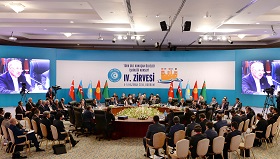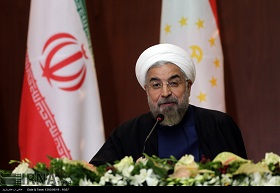The Ukrainian crisis, when analyzed in terms of timing and breadth, could not but exert a significant influence on the socio-political landscape of the post-Soviet space. Moreover, the crisis seems to have put an end to the concept of the “post-Soviet space,” which has long been somewhat vague and reassuring.
The Ukrainian crisis, when analyzed in terms of timing and breadth, could not but exert a significant influence on the socio-political landscape of the post-Soviet space. Moreover, the crisis seems to have put an end to the concept of the “post-Soviet space,” which has long been somewhat vague and reassuring.
The extent and type of the influence of the Ukrainian situation on other countries varies depending on their location and domestic conditions, but, obviously, the crisis will have a significant impact on the perception of Russia’s role in its nearest neighborhood. In this regard, it is important to understand the effects produced by the Ukrainian crisis on the Central Asian states, which are considered not only as an integral sphere of Russian influence, but also as the main platform for implementing the Eurasian integration project.
Despite the fact that information in Central Asian states is essentially closed off, monitoring the signs allows us to assume a high probability that the Ukrainian crisis has revived regional elites’ dormant fears of internal destabilization and of possible outside intervention. Thus, the delicate balance based on Russia’s role as the key external guarantor of the internal security of not only regimes but of societies as well has been put at risk.
The Ukrainian Scenario for Central Asia: Reflections and Distortions
The first shocking reaction to the events unfolding in Kiev was caused by the fear of a repetition of the Ukrainian scenario in the region, which faces much more acute ethnic and elite conflicts. The official assessments of the destabilization in Ukraine were based on the historical memory of the turbulent 1990s and the political cataclysms in the mid-2000s. Analyzing the confrontation on the Maidan, President of Tajikistan Emomali Rahmon has repeatedly referred to the national experience of “armed conflict, which led to the most devastating social, economic and humanitarian consequences for the country”. The public debate in Kyrgyzstan, a country that had survived two coups in 2005 and 2010, was focused on discussing the possibility of a repeat such an experience, especially amidst the collapse of the coalition government in March 2014 following a corruption scandal.
However, the events in Ukraine during the winter of 2013-2014 were not considered in conjunction with Russia and were rather viewed through the prism of Western intervention in line with the concept of “regime change”.
The Crimean developments, which followed a collapse of power in Ukraine, have not just aggravated general anxieties, but have also largely shifted attention and turned eyes to Moscow. Changing the territorial boundaries of the post-Soviet space has been always perceived painfully in Central Asia, due to the many diverse rationales for possible geographical revisions in the region.
In an attempt to understand Russia’s reasoning on the Crimean issue, the political elites in the region have highlighted the problem of military-political security and humanitarian aspects related to the Russian language and Russian minorities. In line with this logic, Tajikistan and Kyrgyzstan feel particularly vulnerable due to the presence of the Russian military contingent on their territory: the largest Russian military facilities abroad are the 201st Motor Rifle Division (base) deployed in Tajikistan (about 7500 people) and the Kant airbase in Kyrgyzstan.
The position of the Russian language and of the minorities in the Central Asian republics is a separate aspect of the problem. Russian policy in the post-Soviet space, which after 2008 has increasingly promoted the issue of protecting compatriots “wherever they may be”, cannot but fuel phobias and speculation, especially in countries where Russian-speaking minorities live in compact settlements. Kazakhstan offers the most vivid example of the latter, as the share of the Slavic population in its northern regions of Akmola, Pavlodar, Kostanai and Northern Kazakhstan varies from 38 to 48 per cent. President Nursultan Nazarbayev has spared no effort in emphasizing the adequacy of his national and cultural policy, insisting on the need for the stable development of Kazakhstan’s linguistic and cultural diversity. “Let’s suppose we enact a legislative prohibition of all languages other than Kazakh. What awaits us then? The fate of Ukraine!” he stated [1].
The official statements of the Central Asian states on the situation in Ukraine reflect their different levels of awareness of the vulnerability caused by such developments. The opposite ends of the spectrum are represented by Turkmenistan, which has not emphasized its attitude to what was happening, and Uzbekistan that stressed its commitment to refraining “from the threat or use of force against the territorial integrity or political independence of any state,” making no mention of the referendum in Crimea [2]. Dushanbe also chose not to focus on the issue of the referendum of the Crimean population and in all its statements drew parallels with the civil war in Tajikistan, thereby condemning the domestic destabilization. Bishkek actually recognized the results of the Crimean referendum, although it semantically left room for ambiguous interpretations: “the results of the referendum in the Crimea from March 16 this year represent the will of absolute majority of the population of the Autonomous Republic. This is an objective reality, despite the polarized estimates that have been given to this referendum.” [3] The position of Astana was most unambiguous and the Ministry of Foreign Affairs of Ukraine even filed a note of protest: the statement issued on March 18, 2015 said that “the referendum held in Crimea is seen in Kazakhstan as a free expression of the will of the Autonomous Republic’s population, while the decision of the Russian Federation under the existing circumstances is regarded with understanding.”
The immediate reaction to the events in Ukraine in the winter of 2013 and spring of 2014 primarily reflects mounting apprehension in Central Asia over national sovereignty and territorial integrity, increased fears of “Russian neo-imperialism,” as well as growing uncertainty about its future foreign policy positioning under the new international political conditions. The official political rhetoric was aimed at preventing sparking a possible nervous response from constituencies of interest within the countries and from key external partners. Under these circumstances, the almost universal conceptualization of the idea that “national security is the security of the political regime” has become the main consequence, which is vividly illustrated by the rescheduling of the presidential elections in Kazakhstan from 2016 to 2015.
Eurasian integration: deep water or still water?
At the same time, Russia's policy during the Ukrainian crisis has started to be assessed in the context of Eurasian integration and of the latter’s costs and benefits not only for the national economies, but for national policies as well. Accordingly, the perception of the Ukrainian crisis has arrived at an analysis of confrontation between Russia and the West and its possible consequences for the countries of the region.
On the one hand, the economic and financial crisis in Russia, worsened by the imposition of sanctions, has exerted an immediate negative influence on the Central Asian economies. Devalued national currencies, higher energy prices, a mass return of migrant workers and reduced remittances from Russia clearly demonstrate the region’s dependence on the level of Russian prosperity and economic development.
On the other hand, the importance of the partnership with Russia does not signify the lack of alternatives to Eurasian integration. On the contrary, the aggravation of the international political situation has triggered a burst of discussions on the expediency of the continued development of the Eurasian Economic Union, which might entail a risk of putting national sovereignty in jeopardy. Apparently, the internal debates in Kazakhstan have become so fierce that the president had to make a high-profile public statement about the existing legal options for Kazakhstan’s withdrawal from the Eurasian Economic Union [4].
Thus, it is important to recognize that the major developments in the international arena and Russia’s role in them are viewed in Central Asia primarily through the prism of their perceptions of threats to national stability, territorial integrity and national sovereignty. The increased feeling of vulnerability inevitably affects the level of trust between the countries of Central Asia and Moscow, as well as between the groups of interest and elites in the region’s states, and therefore endangers the social contract, based on ethnic grounds. The Central Asian capitals happen to be navigating between Scylla and Charybdis: they have to reassure their societies and at the same time convince external partners of their loyalty.
This situation is fraught with unexpected destabilization even without any direct intervention from external forces, simply by virtue of its inherent instability. Russia may sincerely believe that it poses no threat to its partners in the region, but this has little to do with their self-reflections under the present stage of international relations. The strength of relations based on this shaky ground remains to be seen.
1. http://ria.ru/world/20140825/1021371883.html
2. Position of the Republic of Uzbekistan on Ukraine and the Crimean issue. - March 24, 2014. http://www.mfa.uz/ru/press/statements/2014/03/1528/
3. Statement of the Ministry of Foreign Affairs of the Kyrgyz Republic on situation in Ukraine and Crimea. http://www.mfa.gov.kg/zayavleniya/view/idnews/9
4. Interview of the President of the Republic of Kazakhstan with Khabar TV Channel in Ulytau on August 24, 2014http://pravo.zakon.kz/4648972-intervju-prezidenta-rk-agentstvu-khabar.html







